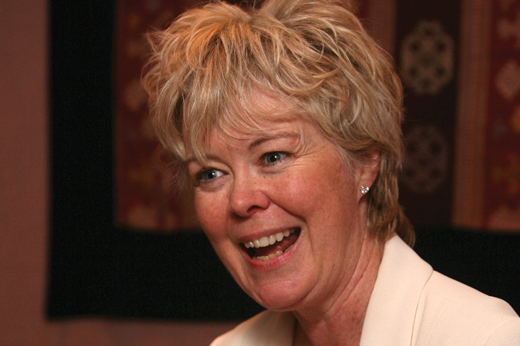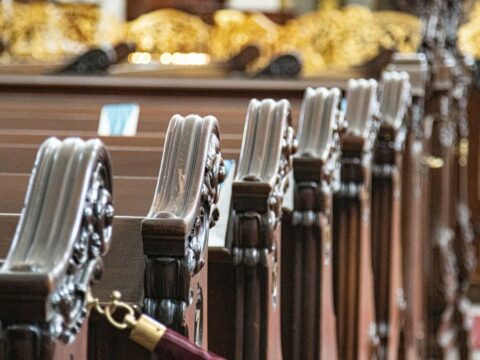Q How did you get started at CBC Radio’s Tapestry?
A I had been working in television for a few years and was at the point where I was staying at home with my young child and I wasn’t actually intending to work again for a long time. I just loved being at home. I guest hosted an episode of Tapestry, and at that time, the host of the show was leaving. It never would have occurred to me to work on the religion beat. I spent nine years in sports and did a lot of daily news reporting. When the job came open, I was talking to my husband about it — he’s a sports writer — and he just burst out laughing and said, “Look at your bookshelves.” Almost all of my pleasure reading was the kind of books I’m now reading for the show. Not so much capital-R religion, but philosophy: Why are we here? What does it all mean? Is life random? What a colleague of mine likes to call the drunken 4 a.m. school dormitory conversations. I guess I had never thought of combining that curiosity and that passion with my working life.
You may unsubscribe from any of our newsletters at any time.
Q When you started hosting the show, what was your spiritual mindset?
A It’s a very tricky question because, as a journalist, this is a beat to me. So it was important to me to be prepared and open-minded and fair-minded and to approach religion-slash-spirituality in the same way you’d want to approach any other beat. My background is Roman Catholic. I’ve married into Judaism and just seem to have a hand in a lot of different traditions and interests.
Q So many events in the news intersect with issues of religion or spirituality. Generally, how well do news organizations cover the spiritual components of those stories?
A I think you tend to get a couple of extremes. And I used that word advisedly, because the word “religious” is so often coupled with the word “extremism.” You can get a mindset that deals with religion as the province of violent people or nuts, or the province of something that is extreme because that’s where this big breaking news is. Religion reporting does still tend to be pretty stark: “Look what these religious people are doing!” As opposed to, “Wait a minute. Maybe these are people asking the most important questions you can ask while you’re here.” We’ve made a conscious effort on the show to look for the subtle-ties and the grey areas.
Q What makes radio a good medium for talking about spirituality?
A I think it’s the medium for talking about spirituality. And I say that as someone whose heart belongs to print. The kind of conversations you can have when the lights are a bit low and you’re sitting in the same place or even when someone is in a different studio miles and miles away . . . there seems to be a built-in intimacy that the other media don’t touch.
In TV, we would have lights abso-lutely blasting, to the point where we’d need half an inch of makeup just to offset the glare of the lighting. You’d have a sound guy. You’d have a camera team. You’d have a lighting guy. It changes the tenor of the conversation. It’s no longer you and I just zoning in. Sometimes [the radio studio] almost becomes, not a therapeutic space, but a space where real listening can happen without all of the distractions. We also choose guests who are very thoughtful, very smart and who have spent a lot of time thinking about these big-ticket items. They’re primed to have really intense conversations.
Q Journalists are often expected to be adversarial or play the devil’s advocate, but on the show, you tend to be very supportive in your delivery. Why?
A Because you’re asking people to talk about things that are so profound to them, I don’t think you can come in and be combative. We like to build in some rough edges — we call it “sandpaper” — so it doesn’t sound like a love-in. And it can’t be Oprah. Nothing against Oprah, but this is journalism. We’re trying to get at things that perhaps people haven’t spoken about or haven’t felt comfortable opening up about before, and that doesn’t happen with the adversarial approach.
Q Was there ever an interview that frustrated you?
A There was, but I feel skittish about naming the person, a very revered figure in spiritual circles. Maybe I was expecting a really spiritually minded, wise and loving person, but I got a very rushed, curt person. And it’s almost as though, “Can you be on this spirituality circuit and be nasty?”
It ended, and the guest said, “Oh, thank you so much. It was so good to be able to talk about this stuff.” And I thought, “Did she think there was some kind of connection there?”
Q What shows have inspired the biggest reactions?
A The things that have inspired the most mail ever are full-show interviews with Rabbi Harold Kushner, who has been on a few times. He is most famous for When Bad Things Happen to Good People, but has written some other stuff.
And there was an ex-priest who died a couple of years ago named John O’Donohue, who was a poet from Ireland. . . . I remember he was on the phone, and his first answer was as though he was writing poetry on the spot. My producer and I looked at each other through the glass and were just gobsmacked. I’m not that articulate, and people who can do that so effortlessly, that’s just a gift.
Q Is there a notable figure not known for his or her theological positions whose brain you would like to pick about spirituality?
A Can I say yes if it’s already happened? What I’m really drawn to is music and musicians, and there were two musicians in the last couple of years: [American gospel singer] Mavis Staples and Victor Wooten, the bass god. And I’m a bass player — I’ve taken up the electric bass in the last six years. Speaking to musicians about the creative process and some kind of spiritual drive within you for something to be created, that’s just magical stuff to me. In both Victor and Mavis, it goes beyond a nebulous sort of, “Oh, you know, something spiritual in me is fuelling what I do.” With Mavis, [what drives her] is very much her lifelong Christianity. For Victor, it’s about the “creative impulse in the universe” sort of thing. And we did [musician and poet] Michael Franti a couple of years ago, and [soul singer] Al Green. I am kind of trying to turn it into a music show while nobody’s looking (laughs).
Q So what other musicians would you like to have on the show?
A You know who it would be? It’s Paul Rodgers who was with [rock bands] Bad Company and Free and now lives in British Columbia. He was just known as “The Voice” for a long time and was always on the top 10 lists of greatest rock vocalists ever. I see on his website, he and his wife often will give away money to people who have done kind deeds. And there is just something so soulful about him.
This interview first appeared in The Observer’s November 2011 issue with the title “Interview with Mary Hynes.”












